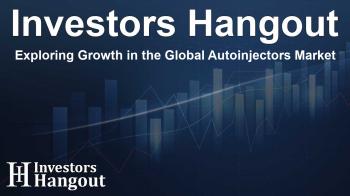Exploring Growth in the Global Autoinjectors Market

An In-Depth Look at the Autoinjectors Market
As the healthcare landscape evolves, the autoinjectors market stands out, showcasing impressive potential for growth. The market is forecasted to soar from USD 68.85 billion in 2024 to an astounding USD 317.01 billion by 2031, growing at a remarkable compound annual growth rate (CAGR) of 23.20%. This tremendous expansion is significantly influenced by a shift towards homecare solutions, increased chronic disease rates, and the rising usage of biologic medications.
Factors Driving Market Growth
The demand for autoinjectors has surged due to several critical factors. One primary driver is the increasing preference from patients for homecare, which allows individuals to manage their treatments in the comfort of their homes without frequent trips to healthcare facilities. Autoinjectors simplify this process, enabling easy self-administration for various chronic conditions, including diabetes and autoimmune disorders.
Patient-Centric Treatments
The transition to homecare means that patients increasingly seek self-administered medical solutions that provide convenience and flexibility. Autoinjectors are designed to fulfill these needs with features like prefilled syringes and disposable designs, making them user-friendly and accessible. In many cases, patients prefer these self-administration devices to avoid the stress associated with needles and the risk of infections.
Expansion of Biologics Market
Moreover, the proliferation of biologic drugs, especially monoclonal antibodies, plays a significant role in fostering the growth of the autoinjectors market. As regulatory agencies globally approve an expanding array of biologics, the demand for user-friendly delivery systems rises correspondingly, positioning autoinjectors as an essential component in patient treatment protocols.
Market Challenges and Restraints
Despite the promising outlook, the autoinjectors market faces certain hurdles. One notable concern is the high cost associated with these devices and the therapies they provide. The expenses involved in manufacturing, as well as the ongoing supply chain costs, can limit access for patients, particularly those without comprehensive insurance coverage or in lower-income regions.
Technical and Regulatory Barriers
Furthermore, technical failures pose significant risks, including incomplete dosage administration or device malfunctions, which could impact patient safety and treatment efficacy. Regulatory bodies such as the FDA and EMA have documented numerous product recalls, which contribute to fears surrounding device reliability among healthcare providers and consumers alike. The stringent regulatory environment presents additional challenges, with the need for rigorous testing and compliance contributing to delays in product launch timelines.
Regional Insights into Market Trends
North America continues to dominate the autoinjectors market, driven by a robust healthcare infrastructure, high prevalence of chronic diseases, and a strong appetite for self-administration technologies. The region benefits from comprehensive reimbursement schemes and significant investments in research and development by leading pharmaceutical companies.
Leading Market Players
Key players in the global autoinjectors market include industry leaders such as Ypsomed, Abbvie, Amgen, Teva, and AstraZeneca, among others. These companies are advancing their portfolios with innovative product designs and strategic initiatives that cater to a growing demand for effective treatment delivery mechanisms.
The Future of Autoinjectors
Looking ahead, stakeholders within the healthcare sector must stay attuned to the evolving dynamics of the autoinjectors market. By understanding both emerging trends and persistent challenges, companies can strategize to enhance their foothold in this burgeoning industry. As consumers increasingly prioritize autonomy and convenience in their healthcare, the role of autoinjectors in facilitating effective and accessible treatment options is bound to grow.
Frequently Asked Questions
What is the projected growth of the autoinjectors market?
The autoinjectors market is expected to grow from USD 68.85 billion in 2024 to USD 317.01 billion by 2031 at a CAGR of 23.20%.
What are autoinjectors primarily used for?
Autoinjectors are primarily used for self-administration of medications in patients with chronic diseases such as diabetes and autoimmune conditions.
What challenges does the autoinjectors market face?
The market faces challenges such as high costs, technical failures, and stringent regulatory hurdles that can restrict access and adoption.
Which regions lead in the autoinjectors market?
North America is currently leading the autoinjectors market due to a strong healthcare infrastructure and high demand for self-administration technologies.
Who are the major players in the autoinjectors market?
Major players include Ypsomed, Abbvie, Amgen, Teva, AstraZeneca, Biogen, and Eli Lilly, among others, contributing to market growth with innovative solutions.
About The Author
Contact Henry Turner privately here. Or send an email with ATTN: Henry Turner as the subject to contact@investorshangout.com.
About Investors Hangout
Investors Hangout is a leading online stock forum for financial discussion and learning, offering a wide range of free tools and resources. It draws in traders of all levels, who exchange market knowledge, investigate trading tactics, and keep an eye on industry developments in real time. Featuring financial articles, stock message boards, quotes, charts, company profiles, and live news updates. Through cooperative learning and a wealth of informational resources, it helps users from novices creating their first portfolios to experts honing their techniques. Join Investors Hangout today: https://investorshangout.com/
The content of this article is based on factual, publicly available information and does not represent legal, financial, or investment advice. Investors Hangout does not offer financial advice, and the author is not a licensed financial advisor. Consult a qualified advisor before making any financial or investment decisions based on this article. This article should not be considered advice to purchase, sell, or hold any securities or other investments. If any of the material provided here is inaccurate, please contact us for corrections.

